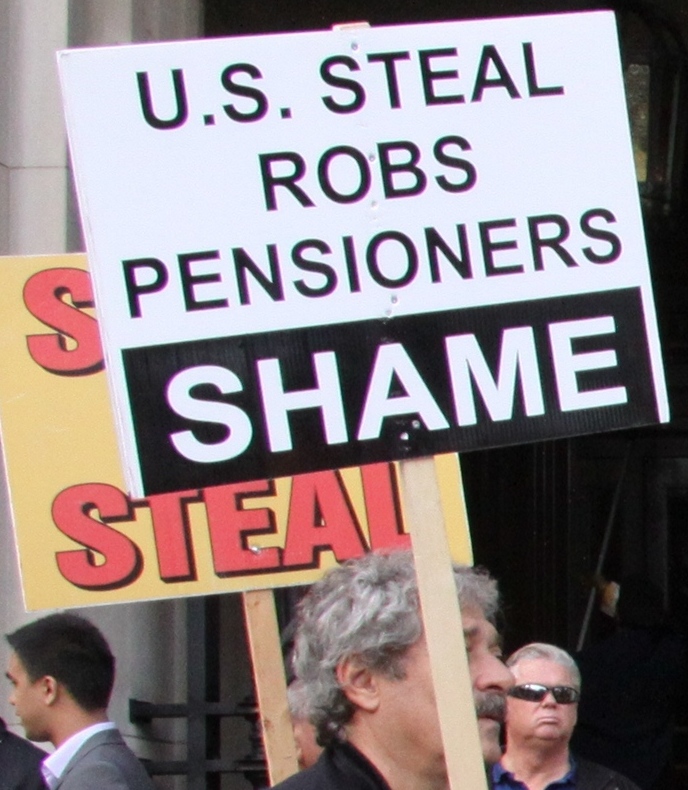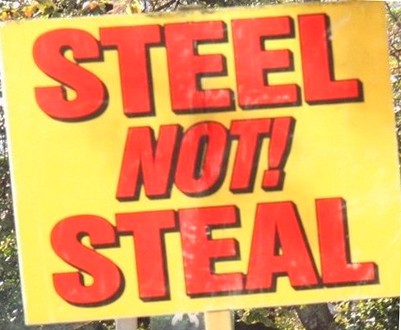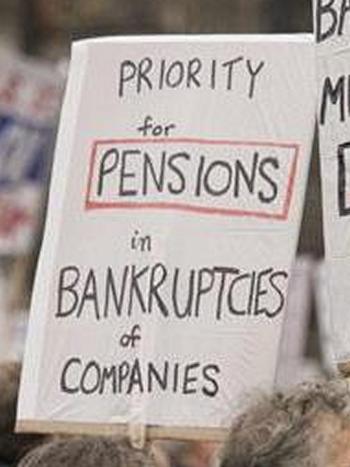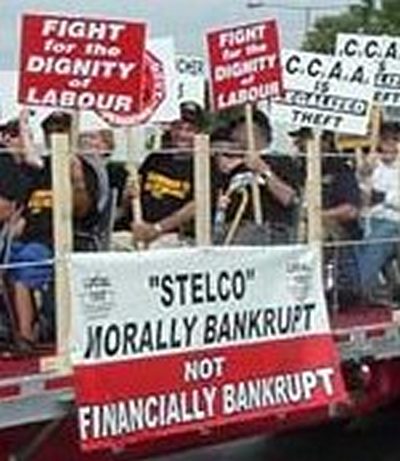|
June 2, 2016
CCAA Court Is No Place to
Settle Important Matters for the People and Economy
The Arrogance of Monopoly Right
PDF
 
CCAA
Court
Is
No
Place
to
Settle Important Matters for the People and Economy
• The
Arrogance of Monopoly Right
• Denial of Workers' Rights in Bankruptcy
Restructuring
• Bankruptcy Protection of U.S. Steel Canada
and Essar Steel Algoma
Is a Public Matter
• The Wily Foxes in Charge of the Henhouse
CCAA Court Is No Place to
Settle Important Matters for the People and Economy
The Arrogance of Monopoly Right
United Steelworkers, USW Local 8782, USW Local 1005 and
the
province of Ontario are appealing a ruling of the Ontario Superior
Court to declare U.S. Steel's equity ownership of
the former Stelco as debt to itself. The ruling under the authority of
the Companies' Creditors Arrangement Act (CCAA)
puts USS in a priority position to be paid upon the forced
sale or liquidation of U.S. Steel Canada, the former Stelco. USS filed
a Responding Factum in the Court of Appeal on May 27, in support of the
original CCAA ruling declaring its equity
in the wholly-owned subsidiary as debt to the parent U.S. corporation.
 In the Factum, USS
acknowledges: In the Factum, USS
acknowledges:
"5. USSC is an indirect, wholly-owned subsidiary of
USS. It is an
integrated steel manufacturer and operates from two principal
facilities: Hamilton Works and Lake Erie Works. Prior
to its acquisition by USS, USSC was known as Stelco Inc.
"6. U. S. Steel Canada Limited Partnership (‘Canada
LP') is a
limited liability partnership formed under the laws of Alberta. Canada
LP is an indirect wholly-owned subsidiary
of USS.
"7. 1344973 Alberta ULC (‘ABULC') was an Alberta
corporation. ABULC
was the acquisition vehicle for USS's acquisition of Stelco."
USS purchased Stelco in 2007 with the deal closing on
October 31.
USS paid $1.1 billion for Stelco's "new shares" from a gang of Social
Wealth Controlling Funds (SWCF) including
Tricap Management Limited, Sunrise Partners Limited Partnership,
Appaloosa Management L.P., and Stelco CEO Rodney Mott, who is from the
U.S. and was parachuted in to facilitate the
sell-out to USS. The SWCF gang seized control of Stelco during CCAA.
Under Stelco's 2004-06 CCAA bankruptcy protection, those in control of
the process eliminated the existing equity
shares, essentially without compensation, and replaced them with new
ones owned by themselves.
Only 18 months after Stelco emerged from CCAA, the SWCF
gang
flipped the company selling all the new shares to USS. U.S. Steel
immediately delisted the new Stelco shares from
the Toronto Stock Exchange making the U.S. parent company the sole
direct owner of Stelco. USS also assumed $800 million in Stelco debt
for a total initial investment of $1.9
billion.
 Prior to a public
announcement closing the deal, USS says a "loan
agreement" was struck with the newly purchased and reorganized
subsidiary, now called U.S. Steel Canada, to
borrow from the parent company, at least on paper, the amount USS paid
to the SWCF gang, approximately $1.9 billion in cash and assumed debt. Prior to a public
announcement closing the deal, USS says a "loan
agreement" was struck with the newly purchased and reorganized
subsidiary, now called U.S. Steel Canada, to
borrow from the parent company, at least on paper, the amount USS paid
to the SWCF gang, approximately $1.9 billion in cash and assumed debt.
USS writes in the Factum:
"8. Canada LP and USSC, are parties to a loan agreement
dated
October 29, 2007 (the ‘Term Loan'), pursuant to which Canada LP made
advances to USSC [...]
"9. As of the date USSC filed for protection under the
CCAA (the
‘Filing Date'), the total amount outstanding under the Term Loan,
including accrued interest, was
C$1,847,169,934."
The initial paper trail to portray the purchase,
investment and
equity ownership of Stelco as debt to itself was followed with
continuous attacks on production at both Hamilton Works
and Lake Erie Works. The shutdowns and losses mounted year after year
culminating in the idling of the blast furnace in Hamilton in 2010, and
permanent cessation of steelmaking in 2013.
Production for the best customers of high-value steel was transferred
to USS plants in the United States.
In tandem with the crippling of production and mounting
losses, USS
created a further paper trail of further large loans to its Canadian
subsidiary totalling $193,089,318 in 2010. The
paper trail continued using its own wholly-owned financial institution
called Credit Corp.
USS writes in the Factum:
"12. Pursuant to a security agreement dated January 28,
2013, as
amended by agreement dated October 30, 2013 (the ‘Security Agreement'),
USSC granted Credit Corp a
general security interest over all of its personal property .
"13. Subsequent to the grant of security by USSC, USSC
made further advances under the Revolver Loan of US$71,000,000.
"14. On November 12, 2013, Credit Corp, USSC, USS and
two other USS
affiliates entered into a further amendment and restatement of the
Security Agreement providing security to
USS and the two USS affiliates in respect of the provision of
intercompany goods and services on credit by any of them to USSC."
The "secure" provision of goods and services now totals
US$49,533,135, according to USS.
Less than a year after the "Security Agreement," USS
put its
wholly-owned Canadian subsidiary into CCAA bankruptcy protection on
September 16, 2014.
 USS writes: USS writes:
"17. USS filed claims in the CCAA proceedings including
unsecured
claims (the ‘Debt Claims', which included amounts owing under the Term
Loan and amounts accrued
under the Revolver Loan prior to the grant of security) for
C$1,847,169,934 and US$120,150,928 and secured claims (the ‘Secured
Claims') in the amount of US$122,471,575."
Under CCAA, the debt claims of USS on its wholly-owned
subsidiary
are superior to most other claims and certainly any equity ownership,
which is generally subordinate to most
claims. The issue of equity ownership of USSC has disappeared into a
deep pit supposedly to be resolved upon exiting CCAA when new ownership
will claim all the assets or bits and
pieces.
The paper trail of debt to itself appears to be
carefully crafted
insurance against a failure of U.S. Steel Canada, which was predictable
given the crippling of production. Some suggest
that the evidence points to something more sinister, a deliberate
wrecking of Stelco as a competitor with minimum financial hardship to
U.S. Steel owners once the payout from the forced
sale of assets is complete. But why go into CCAA to sell the assets?
The major difference in a sale of assets under CCAA bankruptcy
protection and outside CCAA is the dumping of the
pension, post-retirement benefits and other financial obligations, the
$150 million loan to the Ontario government and other loans and
payments to suppliers and contractors. The total on
that front is more than what USS is now demanding as a priority debt to
itself. Of course, this scheme would only work if USS could transform
its equity into debt to itself and the CCAA
authority and federal and Ontario governments bow down to monopoly
right and negate public right.
Many Canadians would say this manoeuvring to serve
narrow private
interests is no way to build an essential sector of the basic economy.
Something has to be done to save the
situation for the good of the Canadian economy, workers, pensioners and
communities. The arrogance of monopoly right has to be curtailed.
Public right to build the nation is paramount.
Monopoly right to wreck the economy and nation must be confronted and
defeated. If defence of the security of the people and their economy is
to mean anything in practice, the state must
act to stop U.S. Steel's wrecking and attack on Canada.
(To be continued
with a further review of the USS Factum. The entire USS Factum is
available here.)

Denial of Workers' Rights in
Bankruptcy Restructuring
Depriving workers and retirees of
their rights in restructuring
should
have no place in modern Canada
Ontario Superior Court Justice Frank Newbould is
overseeing the bankruptcy protection and restructuring of Essar Steel
Algoma under the federal authority of the Companies'
Creditors Arrangement Act (CCAA). Justice Newbould admits publicly
that he has no competence in economic matters and prefers to leave
decisions in the hands of the financial
oligarchy. Soo Today wrote on May 19, "Justice Newbould ruled
that he was poorly equipped to second-guess a decision on financial
viability made by Essar Steel Algoma in
conjunction with 'highly qualified professionals with great experience
in restructuring. Under our corporate law, a court should be loath to
interfere with the good faith exercise of the
business judgment of directors and officers of a corporation,' the
judge said."
The statement belies belief. Does the judge not realize
that he is overseeing the bankruptcy protection of a major corporation
in an
essential sector? Similar "professionals, directors and officers"
put Algoma Steel into such a mess that it has sought bankruptcy
protection under the CCAA not once but three times in the last 25
years! No root problem has been sorted out by these
"highly qualified professionals" yet "under our corporate law," says
the judge, the court system is nonetheless "loath to interfere with the
good faith exercise of the business judgment of
[these] directors and officers."
Newbould's subjective assessment of those in charge is
irrelevant, as is his own admission of incompetence in economic
affairs. The issue with the CCAA court, which renders it
useless to sort out any economic problem, is the violation of the
rights of the workers, salaried employees, retirees and people in the
affected workplaces and communities. This alone
renders the CCAA court invalid and no place to settle matters of such
importance for the people and economy.
A modern economy cannot function without equilibrium in
the social relations between those in control of the productive forces
and the working class. "The good faith exercise of the
business judgment of directors and officers of a corporation" must
begin with the recognition of the rights of all those involved not just
those who own and control the enterprise. The aim
of the public authority overseeing the restructuring of a struggling
company must serve the interests of all those affected not just the
directors and officers of the enterprise or those
presently in control of the bankruptcy process and restructuring.
 The same backward view of
non-interference in management rights is thrown at unions that organize
to represent the interests of workers at an enterprise. Workers are
told not "to
interfere with the good faith exercise of the business judgment" of the
professionals in control who represent the private interests of the
owners and directors. Many in control of enterprises
fight against equilibrium such as the present case in Hamilton where
the German imperialists who control MANA refuse to negotiate with
steelworkers and have locked them out for over
three years. Workers are told they should have no rights, no say over
their wages and working conditions and no right to veto decisions of
management that go against the interests of the
workers. The working class finds itself in a constant battle to
organize to defend itself in all situations to uphold its dignity and
affirm its rights and this includes under CCAA. The same backward view of
non-interference in management rights is thrown at unions that organize
to represent the interests of workers at an enterprise. Workers are
told not "to
interfere with the good faith exercise of the business judgment" of the
professionals in control who represent the private interests of the
owners and directors. Many in control of enterprises
fight against equilibrium such as the present case in Hamilton where
the German imperialists who control MANA refuse to negotiate with
steelworkers and have locked them out for over
three years. Workers are told they should have no rights, no say over
their wages and working conditions and no right to veto decisions of
management that go against the interests of the
workers. The working class finds itself in a constant battle to
organize to defend itself in all situations to uphold its dignity and
affirm its rights and this includes under CCAA.
The disequilibrium in relations of production is a
major reason why economic problems and crises keep recurring. No
problem can be sorted out that serves the general public interest
and brings some stability to the economy and society without
equilibrium in the social relation between the working class and those
who own and control social wealth. To deal with these
situations and problems where a large company is in difficulty, a
public authority is necessary, which assumes control and as first
principle recognizes and upholds the rights of all those
involved including importantly the active and retired workers.
The Ontario Superior Court is clearly not such a public
authority and should not be involved in restructuring of companies. An
alternative public authority serving the broad public
interest must be constituted that can bring a climate of equilibrium to
restructuring by upholding as first principle the rights of all those
involved and affected, including importantly the
active and retired working class.

Bankruptcy Protection of U.S. Steel Canada and
Essar Steel Algoma Is a Public Matter
Justices Frank Newbould and Herman J. Wilton-Siegel of
the Ontario Superior Court are respectively in charge of the bankruptcy
restructuring of Essar Steel Algoma and U.S. Steel
Canada (USSC) in the crucial steel sector of the economy. Algoma Steel
employs over two thousand steelworkers and salaried personnel while
USSC still has over a thousand, which is down
substantially since U.S. Steel seized control of Stelco in 2007. The
two companies bear the social and economic responsibility for tens of
thousands of retirees and their dependents, buy
millions of dollars worth of supplies from local companies annually,
and the value steelworkers produce provides enormous public revenue for
the municipal, provincial and federal
governments. Algoma Steel is estimated to affect in one way or another
around 70 per cent of the 80,000 people who live in Sault Ste. Marie.
 The fate of Essar Steel
Algoma and USSC currently under bankruptcy protection of the
Companies' Creditors Arrangement Act (CCAA) is not a private matter
for certain
powerful members of the financial oligarchy and court to decide. The
fate of these monopolies is a public matter and should be in the hands
of a competent public authority that upholds as
first principle the rights of those affected and the well-being of the
public interest and Canadian economy. Such a public authority should
recognize and involve those directly affected by
the restructuring and ensure that they and their peers have a say in
the resolution and importantly a veto over any decisions that are taken. The fate of Essar Steel
Algoma and USSC currently under bankruptcy protection of the
Companies' Creditors Arrangement Act (CCAA) is not a private matter
for certain
powerful members of the financial oligarchy and court to decide. The
fate of these monopolies is a public matter and should be in the hands
of a competent public authority that upholds as
first principle the rights of those affected and the well-being of the
public interest and Canadian economy. Such a public authority should
recognize and involve those directly affected by
the restructuring and ensure that they and their peers have a say in
the resolution and importantly a veto over any decisions that are taken.
The CCAA has proven in practice that certain powerful
members of the financial oligarchy and their allies in the big law
firms use the court to serve their narrow private interests
skirting existing laws and social responsibilities for pensions,
benefits and taxes. It must stop! The restructuring of major
corporations is a public matter and concerns the public interest.
Public right must not be overwhelmed by monopoly right in restructuring
otherwise the process holds no legitimacy, stands in contempt of
society, and will sort out no problem affecting
the economy and common good.
From its practice serving monopoly right, the CCAA
court has lost all legitimacy and should have nothing to do with
restructuring companies in the basic sectors of the economy. A
public authority must be established to deal with corporate
restructuring. As first principle such a public authority must
recognize and give pride of place to those directly affected and
implicated in the operation of the company and their peers, including
the workers, salaried employees, retirees, management, suppliers, and
residents in the surrounding communities. No
one or group should occupy a privileged position with a structured
hierarchy of rights such as now exists within CCAA. The problems should
be sorted out in the public interest and for the
good of the broad common economy, not for the good of some narrow
private interest such as that of U.S. Steel's demand to wreck and
liquidate Stelco's assets and be first in line to seize
whatever they bring in money.
 Bankruptcy restructuring is
a public not a private matter. The activities of big companies in the
basic sectors affect the entire economy and the well-being and security
of the people.
The stability and viability of big companies are a concern of all
Canadians, especially those workers and retirees directly affected. The
public process to resolve the recurring problems
confronting companies active in the basic sectors must serve the broad
public interest and common good of the economy and not bend its will to
the narrow private interests of those who
own and control the company. Ownership must be seen as just one factor
in the relations of production at a company that must submit to
equilibrium with all the other factors if problems
are to be resolved and the economy stabilized and rights secured.
Direct experience has shown that no good comes from a process that
deprives those affected of their rights. For many
steelworkers and retirees of Algoma Steel this is the third time in
CCAA and at Stelco the second time. Bankruptcy restructuring is
a public not a private matter. The activities of big companies in the
basic sectors affect the entire economy and the well-being and security
of the people.
The stability and viability of big companies are a concern of all
Canadians, especially those workers and retirees directly affected. The
public process to resolve the recurring problems
confronting companies active in the basic sectors must serve the broad
public interest and common good of the economy and not bend its will to
the narrow private interests of those who
own and control the company. Ownership must be seen as just one factor
in the relations of production at a company that must submit to
equilibrium with all the other factors if problems
are to be resolved and the economy stabilized and rights secured.
Direct experience has shown that no good comes from a process that
deprives those affected of their rights. For many
steelworkers and retirees of Algoma Steel this is the third time in
CCAA and at Stelco the second time.
The Ontario and federal governments must stop the
charade of CCAA restructuring of Algoma Steel, U.S. Steel Canada and
other big companies and constitute a legitimate public
authority to deal with the economic problems in the public interest and
common good.

The Wily Foxes in Charge of the Henhouse
Justice Newbould overseeing the bankruptcy
restructuring of Essar Steel Algoma is quoted as saying he would never
doubt the judgement of the professionals, directors and officers in
control of the process under the Companies' Creditors Arrangement
Act (CCAA). The statement itself throws contempt on the search to
find viable solutions to the economic
problems confronting Algoma Steel. The professionals involved in the
CCAA are in a conflict of interest. For example, the lead lender of the
Algoma Debtor-In-Possession (DIP) is Deutsche
Bank. Under the CCAA process, the DIP lender has enormous power to
manage the outcome to serve its private interests. Large creditors of
Essar Steel Algoma have loudly and publicly
accused Deutsche Bank of manipulating the restructuring and not
allowing a viable outcome given the recent rapid rise of steel market
prices.
 The professionals and
officials in control under CCAA can also be the same people
representing the same private interests who put the company into the
current crisis in the first place.
At the very least, these professionals should be harshly judged for not
having found any solutions to the economic problems at Algoma Steel and
Stelco and in the steel sector in general
over the last decades. With constantly recurring crises, it has become
obvious to many Canadians that an alternative to CCAA must be found
that solves problems in the public interest and
common good and does not submit to monopoly right. The professionals and
officials in control under CCAA can also be the same people
representing the same private interests who put the company into the
current crisis in the first place.
At the very least, these professionals should be harshly judged for not
having found any solutions to the economic problems at Algoma Steel and
Stelco and in the steel sector in general
over the last decades. With constantly recurring crises, it has become
obvious to many Canadians that an alternative to CCAA must be found
that solves problems in the public interest and
common good and does not submit to monopoly right.
Steelworkers with knowledge of the Essar Steel Algoma
restructuring process say that rumours are constantly being circulated
to push this or that competing private interest. For
example, rumours were spread that the Essar Group did not have the
financial backing to underwrite the restructuring. This talk is not
made a matter of public knowledge with concrete
evidence so that it can be discussed and verified. Instead, important
issues are simply asserted and spread around to discredit competing
interests such as the Essar bid, which was
subsequently disqualified.
Whether Essar Group is financially sound or not was the
specific issue that Justice Newbould said he was not competent to
judge. After exposing his own ignorance in economic matters
he ordered everyone involved to disqualify themselves as competent in
economic matters as well and just accept without investigation the
assessment of "highly qualified professionals with
great experience in restructuring" and not "interfere with the good
faith exercise of the business judgment of directors and officers of a
corporation." Ah yes Justice Newbould, we should
just let those wily foxes run wild in the henhouse without oversight
and control because we all know, as you have ordered us to know and do,
that their hearts and motives are pure and
their hunger for chicken will not get the best of them.
The atmosphere of rumours and gossip is compounded by
the official secrecy imposed on the participants. Even amongst the
legal participants a hierarchy of privilege exists with
certain people privy to inside knowledge and decision-making while
others are not. This became starkly evident when Algoma Local 2251
United Steelworkers was left out of the loop on the decision to
exclude the Essar Group bid. How can real solutions be found to real
problems in such a backward and suffocating atmosphere?
Not informing representatives from Algoma Local 2251 of
the decision to exclude Essar Group from the next stage of bidding
makes a mockery of the restructuring process. Justice
Newbould further insults the steelworkers by stating that even if they
had been informed they had no right to participate in making the
decision so there is no point to revisit the ruling. This
further exposes the arbitrariness and illegitimacy of the CCAA system
and its incapacity to solve real problems.
Whether or not the Essar Group has the financial
capability to underwrite the restructuring should be made public
knowledge so that it can be investigated and verified. The justice
rejects any public oversight or participation with his view that "he
[is] poorly equipped to second-guess a decision on financial viability
made by Essar Steel Algoma in conjunction with 'highly qualified
professionals with great experience in restructuring.'" Everything is
to remain secret and in the hands of privileged private interests that
stand to gain from the
outcome -- the wily foxes in charge of the henhouse. Little wonder that
this marks the third time in CCAA for Algoma Steel.
 The justice dismissed calls
for a review of the decision saying the outcome would be irrelevant as
union representatives have no say or control over the decision.
Regarding this issue,
the Globe and Mail reports that Mike Da Prat, President of
Local 2251 said the union is unlikely to appeal the decision, as the
CCAA court system does not favour unions. Workers
and their allies across Canada are rapidly reaching a similar
conclusion. The CCAA is an arbitrary broken system that is irreparable
because its purpose is to serve the narrow private
interests of the financial oligarchy. This is fundamentally wrong and
damaging to the lives of Canadians and their economy, especially those
directly affected by these CCAA
restructurings. The justice dismissed calls
for a review of the decision saying the outcome would be irrelevant as
union representatives have no say or control over the decision.
Regarding this issue,
the Globe and Mail reports that Mike Da Prat, President of
Local 2251 said the union is unlikely to appeal the decision, as the
CCAA court system does not favour unions. Workers
and their allies across Canada are rapidly reaching a similar
conclusion. The CCAA is an arbitrary broken system that is irreparable
because its purpose is to serve the narrow private
interests of the financial oligarchy. This is fundamentally wrong and
damaging to the lives of Canadians and their economy, especially those
directly affected by these CCAA
restructurings.
The CCAA process clearly exposes it as the open dictate
of finance capital over the people to serve narrow private interests in
opposition to the public interest, economy and common
good. The CCAA is not a place where an arrangement can be found that
considers as fundamental the well-being and security of workers,
retirees and all affected. Rather, the CCAA is a
place of brutal dictate by "professionals," "directors and officers,"
which the justices then rubberstamp with their arcane rulings.
This is unacceptable to Canadians. A public authority
responsible to the people and upholding the public interest must be
constituted to deal with these restructurings of important
monopolies in the basic sectors of the economy.

PREVIOUS
ISSUES | HOME
Read The Marxist-Leninist
Daily
Website: www.cpcml.ca
Email: editor@cpcml.ca
|


 USS writes:
USS writes: 
 The same backward view of
non-interference in management rights is thrown at unions that organize
to represent the interests of workers at an enterprise. Workers are
told not "to
interfere with the good faith exercise of the business judgment" of the
professionals in control who represent the private interests of the
owners and directors. Many in control of enterprises
fight against equilibrium such as the present case in Hamilton where
the German imperialists who control MANA refuse to negotiate with
steelworkers and have locked them out for over
three years. Workers are told they should have no rights, no say over
their wages and working conditions and no right to veto decisions of
management that go against the interests of the
workers. The working class finds itself in a constant battle to
organize to defend itself in all situations to uphold its dignity and
affirm its rights and this includes under CCAA.
The same backward view of
non-interference in management rights is thrown at unions that organize
to represent the interests of workers at an enterprise. Workers are
told not "to
interfere with the good faith exercise of the business judgment" of the
professionals in control who represent the private interests of the
owners and directors. Many in control of enterprises
fight against equilibrium such as the present case in Hamilton where
the German imperialists who control MANA refuse to negotiate with
steelworkers and have locked them out for over
three years. Workers are told they should have no rights, no say over
their wages and working conditions and no right to veto decisions of
management that go against the interests of the
workers. The working class finds itself in a constant battle to
organize to defend itself in all situations to uphold its dignity and
affirm its rights and this includes under CCAA. The fate of Essar Steel
Algoma and USSC currently under bankruptcy protection of the
Companies' Creditors Arrangement Act (CCAA) is not a private matter
for certain
powerful members of the financial oligarchy and court to decide. The
fate of these monopolies is a public matter and should be in the hands
of a competent public authority that upholds as
first principle the rights of those affected and the well-being of the
public interest and Canadian economy. Such a public authority should
recognize and involve those directly affected by
the restructuring and ensure that they and their peers have a say in
the resolution and importantly a veto over any decisions that are taken.
The fate of Essar Steel
Algoma and USSC currently under bankruptcy protection of the
Companies' Creditors Arrangement Act (CCAA) is not a private matter
for certain
powerful members of the financial oligarchy and court to decide. The
fate of these monopolies is a public matter and should be in the hands
of a competent public authority that upholds as
first principle the rights of those affected and the well-being of the
public interest and Canadian economy. Such a public authority should
recognize and involve those directly affected by
the restructuring and ensure that they and their peers have a say in
the resolution and importantly a veto over any decisions that are taken. Bankruptcy restructuring is
a public not a private matter. The activities of big companies in the
basic sectors affect the entire economy and the well-being and security
of the people.
The stability and viability of big companies are a concern of all
Canadians, especially those workers and retirees directly affected. The
public process to resolve the recurring problems
confronting companies active in the basic sectors must serve the broad
public interest and common good of the economy and not bend its will to
the narrow private interests of those who
own and control the company. Ownership must be seen as just one factor
in the relations of production at a company that must submit to
equilibrium with all the other factors if problems
are to be resolved and the economy stabilized and rights secured.
Direct experience has shown that no good comes from a process that
deprives those affected of their rights. For many
steelworkers and retirees of Algoma Steel this is the third time in
CCAA and at Stelco the second time.
Bankruptcy restructuring is
a public not a private matter. The activities of big companies in the
basic sectors affect the entire economy and the well-being and security
of the people.
The stability and viability of big companies are a concern of all
Canadians, especially those workers and retirees directly affected. The
public process to resolve the recurring problems
confronting companies active in the basic sectors must serve the broad
public interest and common good of the economy and not bend its will to
the narrow private interests of those who
own and control the company. Ownership must be seen as just one factor
in the relations of production at a company that must submit to
equilibrium with all the other factors if problems
are to be resolved and the economy stabilized and rights secured.
Direct experience has shown that no good comes from a process that
deprives those affected of their rights. For many
steelworkers and retirees of Algoma Steel this is the third time in
CCAA and at Stelco the second time. The professionals and
officials in control under CCAA can also be the same people
representing the same private interests who put the company into the
current crisis in the first place.
At the very least, these professionals should be harshly judged for not
having found any solutions to the economic problems at Algoma Steel and
Stelco and in the steel sector in general
over the last decades. With constantly recurring crises, it has become
obvious to many Canadians that an alternative to CCAA must be found
that solves problems in the public interest and
common good and does not submit to monopoly right.
The professionals and
officials in control under CCAA can also be the same people
representing the same private interests who put the company into the
current crisis in the first place.
At the very least, these professionals should be harshly judged for not
having found any solutions to the economic problems at Algoma Steel and
Stelco and in the steel sector in general
over the last decades. With constantly recurring crises, it has become
obvious to many Canadians that an alternative to CCAA must be found
that solves problems in the public interest and
common good and does not submit to monopoly right. The justice dismissed calls
for a review of the decision saying the outcome would be irrelevant as
union representatives have no say or control over the decision.
Regarding this issue,
the Globe and Mail reports that Mike Da Prat, President of
Local 2251 said the union is unlikely to appeal the decision, as the
CCAA court system does not favour unions. Workers
and their allies across Canada are rapidly reaching a similar
conclusion. The CCAA is an arbitrary broken system that is irreparable
because its purpose is to serve the narrow private
interests of the financial oligarchy. This is fundamentally wrong and
damaging to the lives of Canadians and their economy, especially those
directly affected by these CCAA
restructurings.
The justice dismissed calls
for a review of the decision saying the outcome would be irrelevant as
union representatives have no say or control over the decision.
Regarding this issue,
the Globe and Mail reports that Mike Da Prat, President of
Local 2251 said the union is unlikely to appeal the decision, as the
CCAA court system does not favour unions. Workers
and their allies across Canada are rapidly reaching a similar
conclusion. The CCAA is an arbitrary broken system that is irreparable
because its purpose is to serve the narrow private
interests of the financial oligarchy. This is fundamentally wrong and
damaging to the lives of Canadians and their economy, especially those
directly affected by these CCAA
restructurings.